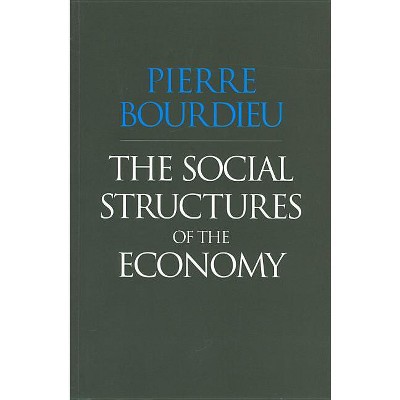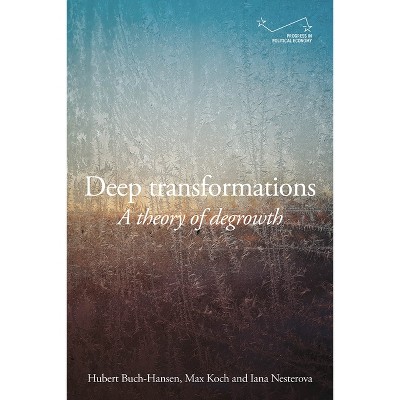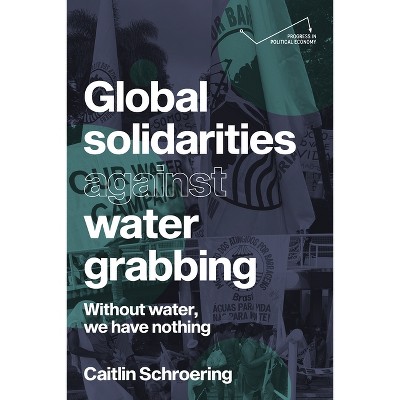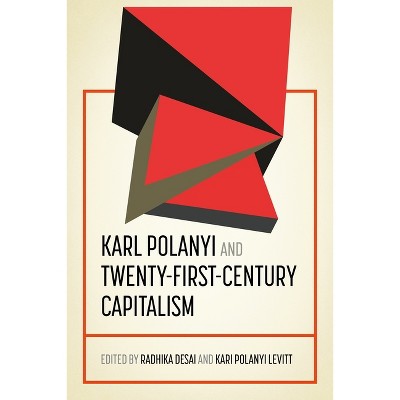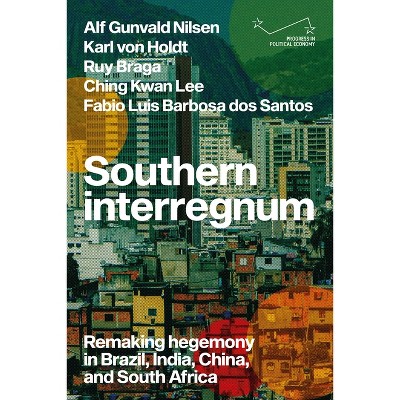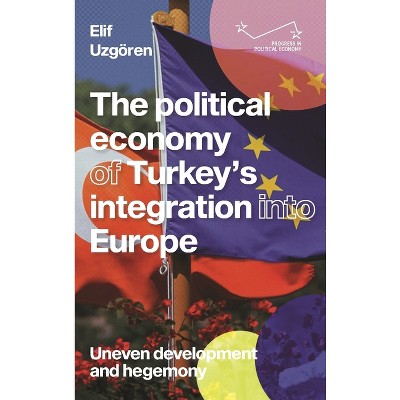Sponsored

Capitalism in Contemporary Iran - (Progress in Political Economy) by Kayhan Valadbaygi (Paperback)
Pre-order
Sponsored
About this item
Highlights
- The book situates Iran within the motions and tendencies of global capitalism and resulting geopolitics to analyse the process of Iranian neoliberalisation and its impacts on the reconfiguration of the ruling class; reshaping of the subaltern classes and their struggles; reorganisation of the form of the state; and foreign policy of the country.
- About the Author: Kayhan Valadbaygi is a Research Fellow at the International Institute of Social History (IISH) in Amsterdam
- 256 Pages
- History, Middle East
- Series Name: Progress in Political Economy
Description
About the Book
The book situates Iran within the motions and tendencies of global capitalism and resulting geopolitics to analyse the process of Iranian neoliberalisation and its impacts on the reconfiguration of the ruling class; reshaping of the subaltern classes and their struggles; reorganisation of the form of the state; and foreign policy of the country.Book Synopsis
The book situates Iran within the motions and tendencies of global capitalism and resulting geopolitics to analyse the process of Iranian neoliberalisation and its impacts on the reconfiguration of the ruling class; reshaping of the subaltern classes and their struggles; reorganisation of the form of the state; and foreign policy of the country.From the Back Cover
'Capitalism in contemporary Iran provides an original account of the modern Iran that rethinks its complex development and revolutionary ruptures through the wider dynamics of global capitalism and its geopolitical sinews. It is a must read for academics, students and political practitioners alike.'
Kamran Matin, University of Sussex
Adam Hanieh, University of Exeter 'Valadbaygi delivers the most influential single book on the making of contemporary Iran and therefore the most valuable in helping us to understand the geopolitics of our times.'
Adam David Morton, University of Sydney 'This book successfully situates Iran in the global history and historical sociology of capitalism. A must-read for anyone interested in Iran.'
Ayse Zarakol, University of Cambridge This book traces the patterns of capital accumulation and the changes in class and state formation emanating from it in Iran during the global neoliberal era. It demonstrates how there are inner connections between the nature of contemporary development in Iran, the form of the state, the ongoing sociopolitical transformations in society and the geopolitical tensions with the West. Simultaneously, it highlights that these issues should be explored in terms of their internal relations to the motions and tendencies of neoliberal global capitalism and resulting geopolitics. Accordingly, the book demonstrates that Iranian neoliberalisation has brought about new contested class dynamics that have fundamentally reconstructed the Iranian ruling class, aggressively shaped and reshaped the working class and the poor, and drastically impacted the state form and its foreign policy.
Review Quotes
'Kayhan Valadbaygi's account of capitalist development and neoliberalisation in Iran pushes back against narratives that seek to explain the socioeconomic transformations in Iran with a sole focus on internal dynamics and essentialist arguments about the state's 'rentier' characteristics and Islamist ideology. Capitalism in Contemporary Iran also challenges standardised models for which capitalist forms are externally imposed; either determined in the West and subsequently effecting the rest or approached as an abstraction above local particularities. Valadbaygi follows the interactions of social, factional, national, regional, and global forces to offer a dynamic account of the historical trajectory of capitalist relations in Iran. The methodological emphasis on relationality enables the book to reject the binary between internal and external factors, and to move beyond static comparisons of the so-called Global North and South.'
The Journal of Development Studies
Adam Hanieh, University of Exeter 'Capitalism in contemporary Iran provides an original account of the modern Iran that rethinks its complex development and revolutionary ruptures through the wider dynamics of global capitalism and its geopolitical sinews. The first book-length application of the philosophy of internal relations to capitalist development in Iran, Capitalism in contemporary Iran synthesises the global and the local to rethink Iran beyond exceptionalism and culturalism through the intersection of social classes, the state, and global capitalism. Capitalism in contemporary Iran is a must read for academics, students and political practitioners alike.'
Kamran Matin, University of Sussex 'With Capitalism in Contemporary Iran Kayhan Valadbaygi delivers the most influential single book on the making of contemporary Iran and therefore the most valuable in helping us to understand the geopolitics of our times.'
Adam David Morton (University of Sydney), co-author with Andreas Bieler of Global Capitalism, Global War, Global Crisis. 'This book successfully situates Iran in the global history and historical sociology of capitalism. A must-read for anyone interested in Iran.'
Ayse Zarakol, University of Cambridge 'Valadbaygi's work builds on an impressive range of sources that make the book essential reading for scholars researching Iran. Its theoretical framework can also inform studies of political economy in other states with comparable positions in international hierarchies. The book offers a strong critique of dominant discussions within Iranian studies.'
Maziar Samiee, University of Sussex 'Incredibly valuable...Valadbaygi's analysis is theoretically solid and academically grounded. The book relies on an extensive set of primary sources in Persian and English, spanning from institutional and independent databases and archives, newspapers and periodical reports, documents from various Iranian ministries and international organizations as well as official documents produced by the European Union and the United States. These materials are combined with a rich and extensive list of secondary sources that show special attention to the intellectual debates and knowledge produced not only for an English-speaki
'Kayhan Valadbaygi's account of capitalist development and neoliberalisation in Iran pushes back against narratives that seek to explain the socioeconomic transformations in Iran with a sole focus on internal dynamics and essentialist arguments about the state's 'rentier' characteristics and Islamist ideology. Capitalism in Contemporary Iran also challenges standardised models for which capitalist forms are externally imposed; either determined in the West and subsequently effecting the rest or approached as an abstraction above local particularities. Valadbaygi follows the interactions of social, factional, national, regional, and global forces to offer a dynamic account of the historical trajectory of capitalist relations in Iran. The methodological emphasis on relationality enables the book to reject the binary between internal and external factors, and to move beyond static comparisons of the so-called Global North and South.'
The Journal of Development Studies
Adam Hanieh, University of Exeter 'Capitalism in contemporary Iran provides an original account of the modern Iran that rethinks its complex development and revolutionary ruptures through the wider dynamics of global capitalism and its geopolitical sinews. The first book-length application of the philosophy of internal relations to capitalist development in Iran, Capitalism in contemporary Iran synthesises the global and the local to rethink Iran beyond exceptionalism and culturalism through the intersection of social classes, the state, and global capitalism. Capitalism in contemporary Iran is a must read for academics, students and political practitioners alike.'
Kamran Matin, University of Sussex 'With Capitalism in Contemporary Iran Kayhan Valadbaygi delivers the most influential single book on the making of contemporary Iran and therefore the most valuable in helping us to understand the geopolitics of our times.'
Adam David Morton (University of Sydney), co-author with Andreas Bieler of Global Capitalism, Global War, Global Crisis. 'This book successfully situates Iran in the global history and historical sociology of capitalism. A must-read for anyone interested in Iran.'
Ayse Zarakol, University of Cambridge 'Valadbaygi's work builds on an impressive range of sources that make the book essential reading for scholars researching Iran. Its theoretical framework can also inform studies of political economy in other states with comparable positions in international hierarchies. The book offers a strong critique of dominant discussions within Iranian studies.'
Maziar Samiee, University of Sussex 'Incredibly valuable...Valadbaygi's analysis is theoretically solid and academically grounded. The book relies on an extensive set of primary sources in Persian and English, spanning from institutional and independent databases and archives, newspapers and periodical reports, documents from various Iranian ministries and international organizations as well as official documents produced by the European Union and the United States. These materials are combined with a rich and extensive list of secondary sources that show special attention to the intellectual debates and knowledge produced not only for an English-speaking audience.'
Stella Morgana, University of Liverpool
About the Author
Kayhan Valadbaygi is a Research Fellow at the International Institute of Social History (IISH) in AmsterdamShipping details
Return details
Frequently bought together


Trending Non-Fiction







